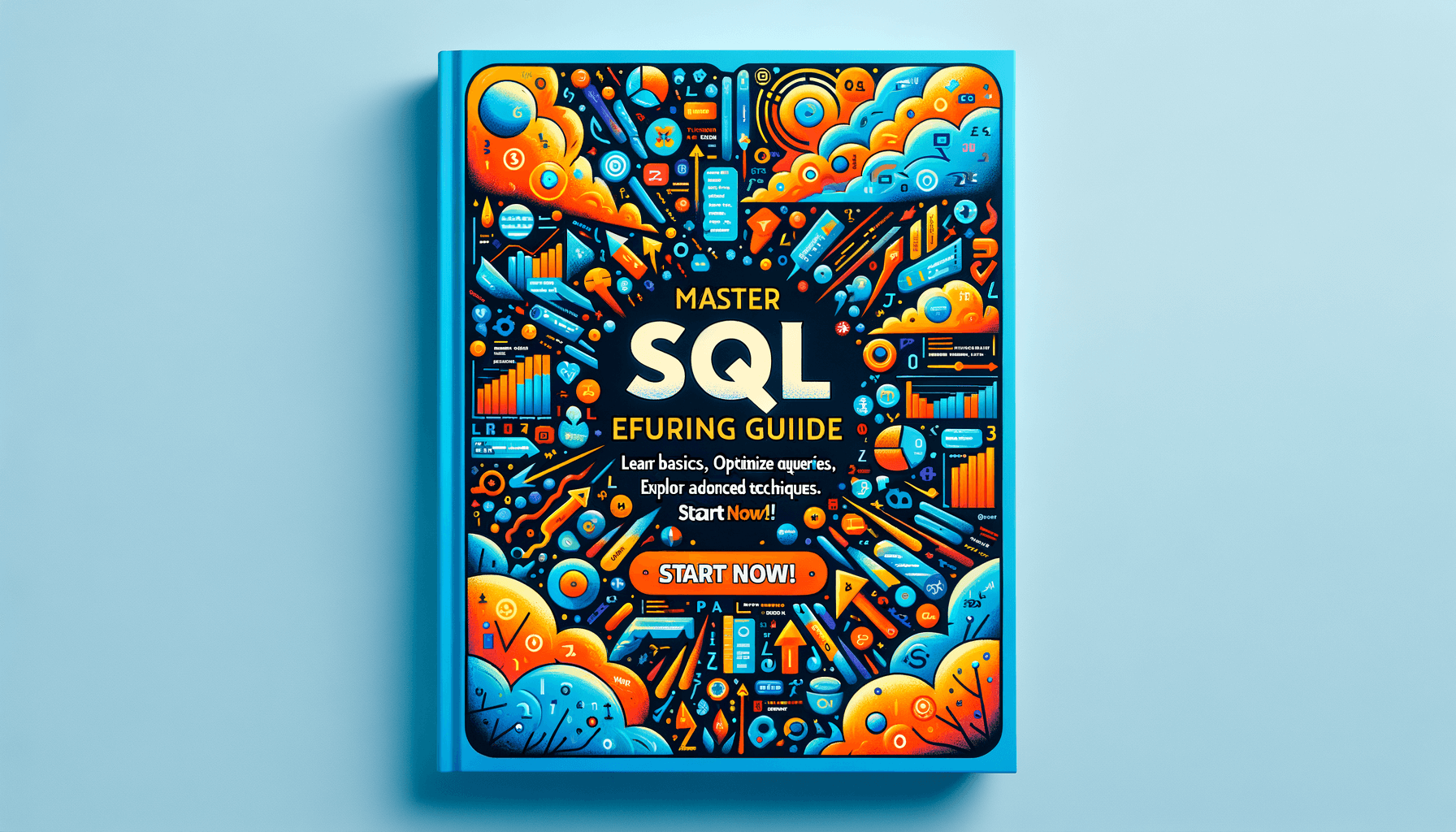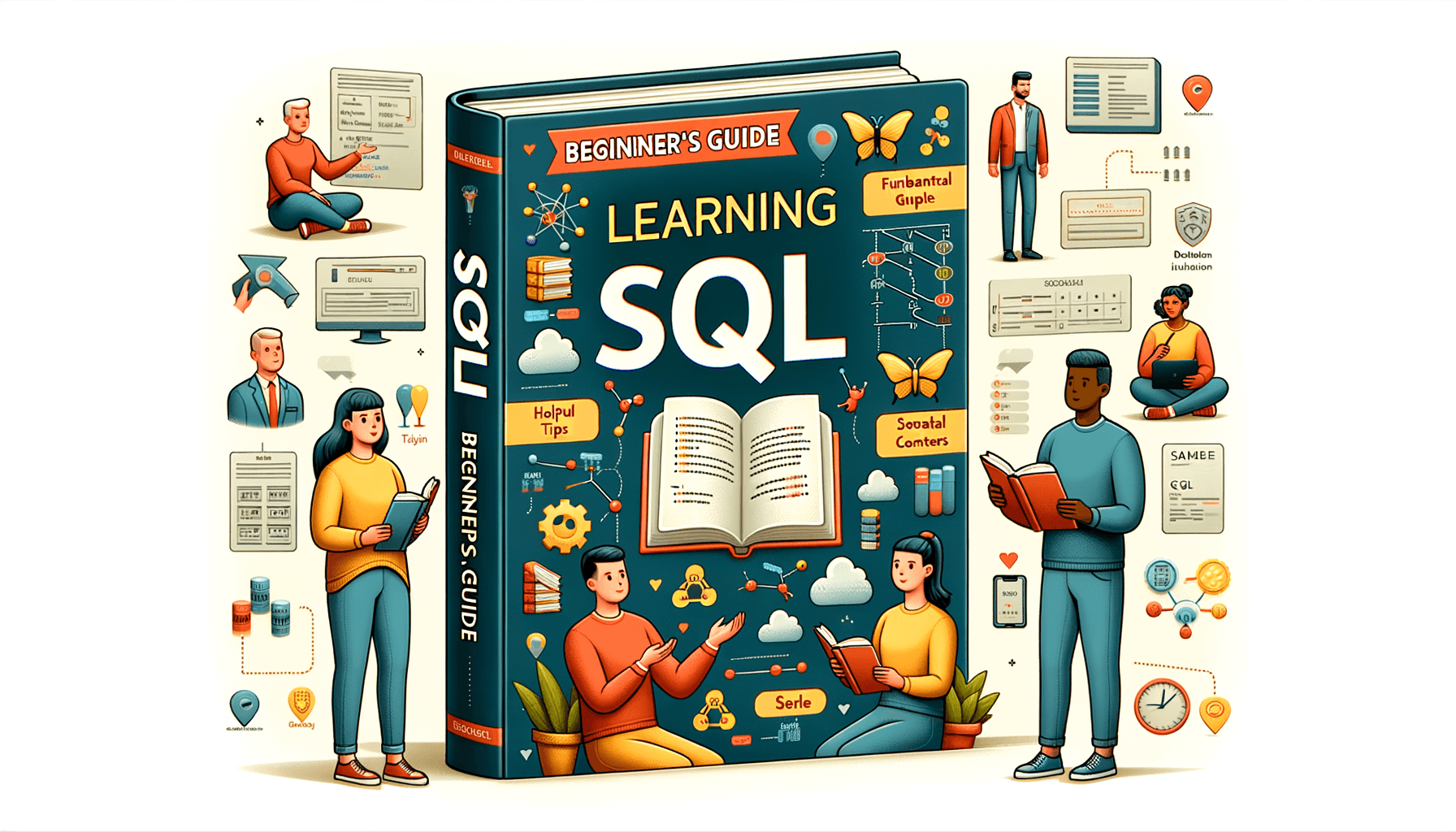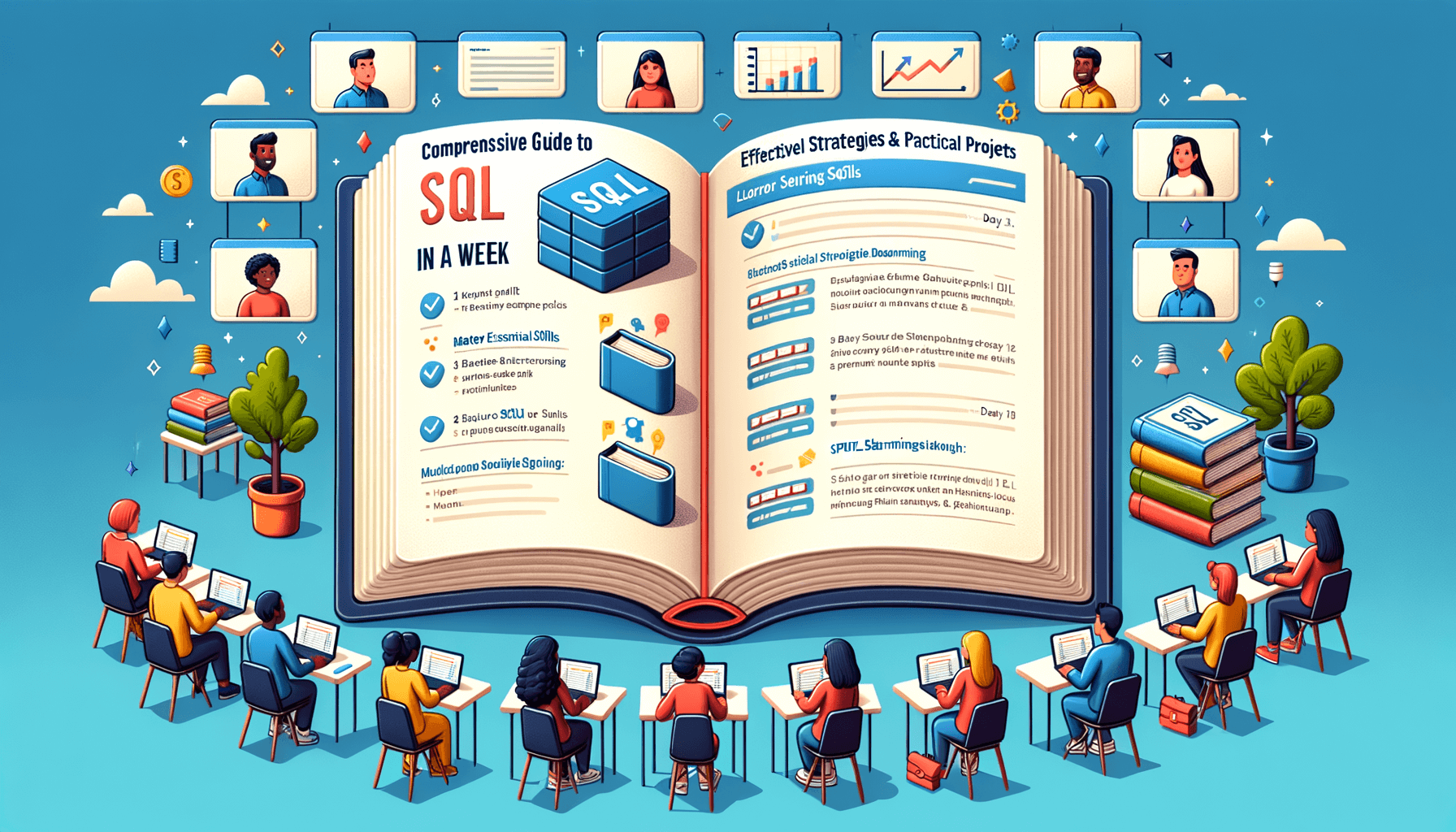A big variety of articles and resources

Mastering Databases: How to Learn SQL Code Efficiently
 Sia Author and Instructor
Learn SQL
Sia Author and Instructor
Learn SQL
9 minute read
Understanding the Basics of SQL
Fundamental Concepts and Terminology
Start with understanding basic SQL concepts such as tables, rows, columns, and data types. SQL provides a standardized way to communicate with databases, making it easier for developers, analysts, and data professionals to access and work with the vast amounts of information stored within these systems. Understanding these fundamental concepts lays the groundwork for your future SQL study.
Setting Up Your SQL Environment
To master SQL quickly, begin by setting up your SQL environment. This involves installing a database management system (DBMS) like MySQL, PostgreSQL, or SQLite. Ensure you have a suitable interface for running SQL queries, such as a command-line tool or a graphical user interface (GUI). Consistent practice in this environment will help you become proficient in months.
Basic SQL Commands
Learn about SQL statements like SELECT, INSERT, UPDATE, and DELETE for querying and manipulating data. Dive deeper into Data Definition Language (DDL) commands like CREATE, ALTER, and DROP for defining and modifying database structures such as tables, indexes, and constraints. These basic commands are essential for any SQL user and form the foundation of more advanced techniques.
Effective Strategies to Learn SQL Code
Learning SQL can be a daunting task, but with the right strategies, you can master it efficiently. Here are some effective strategies to help you on your journey to becoming proficient in SQL.
Utilizing Online Courses and Tutorials
Online courses and tutorials are some of the best ways to master SQL. Platforms like Coursera, Udemy, and YouTube offer a plethora of resources that cater to different learning styles. Watching YouTube tutorials and taking online courses are highly recommended for beginners. These resources often provide step-by-step guides and practical examples that make learning easier.
Hands-On Practice and Real-World Scenarios
To truly understand SQL, you need to apply it to real-world tasks and activities. SQL coding challenges and competitions on platforms like HackerRank and CodeSignal are great ways to challenge your skills and learn new tricks. Practice scenarios from the real world to gain hands-on experience and build a solid foundation.
Joining SQL Communities and Forums
Joining SQL communities and forums can provide you with valuable insights and support. Engaging with fellow SQL enthusiasts allows you to share knowledge, ask questions, and solve problems together. These communities can be a great way to network and stay updated with the latest trends and best practices in SQL.
Effective learning strategies include a mix of online resources, hands-on practice, and community engagement. By combining these approaches, you can overcome challenges and become proficient in SQL more efficiently.
Writing Optimized SQL Queries
Crafting efficient, optimized SQL queries lies at the heart of database management. The speed and performance of your data retrieval largely depend upon how well your SQL queries are written. This section discusses the intricacies of SQL query optimization and the benefits of indexing and performance tuning.
Advanced SQL Techniques
Subqueries and Nested Queries
Subqueries, also known as inner queries or nested queries, are a powerful feature in SQL that allow you to perform complex operations in a single query. They can be used in various clauses like SELECT, FROM, WHERE, and HAVING. Mastering subqueries can significantly enhance your ability to retrieve and manipulate data efficiently.
Using Joins Effectively
Joins are essential for combining data from multiple tables based on related columns. There are several types of joins, including INNER JOIN, LEFT JOIN, RIGHT JOIN, and FULL OUTER JOIN. Understanding when and how to use each type of join is crucial for writing efficient and accurate queries. Here are some common types of joins:
- INNER JOIN: Returns records that have matching values in both tables.
- LEFT JOIN: Returns all records from the left table, and the matched records from the right table.
- RIGHT JOIN: Returns all records from the right table, and the matched records from the left table.
- FULL OUTER JOIN: Returns all records when there is a match in either left or right table.
Indexing for Faster Query Performance
Indexing is a technique used to improve the speed of data retrieval operations on a database table. By creating indexes on columns that are frequently used in query conditions, you can significantly reduce the time it takes to execute queries. However, it's important to use indexes judiciously, as they can also slow down data modification operations like INSERT, UPDATE, and DELETE.
Proper indexing can be a game-changer for database performance, but it requires careful planning and understanding of your data and query patterns.
Troubleshooting Common SQL Issues
Identifying Performance Bottlenecks
Performance bottlenecks can significantly hinder your SQL operations, impacting the speed and efficiency of your data analysis. These bottlenecks can arise from various sources, including poorly written queries, the absence of necessary indexes, or even hardware limitations. A comprehensive approach is required to identify and address these issues effectively.
Ensuring Data Integrity
Ensuring data integrity is crucial for maintaining the accuracy and reliability of your database. This involves implementing constraints, such as primary keys and foreign keys, and regularly validating your data. Mastering data manipulation techniques can also help in maintaining data integrity.
Debugging SQL Code
Debugging SQL code is an essential skill for any database professional. Regularly review and debug queries to identify syntax mistakes and improve efficiency. Break down challenges into smaller pieces, analyze issues, and solve them step by step. Make use of online resources like manuals, tutorials, and forums for explanations and solutions.
Regular debugging and validation are key to writing efficient queries and ensuring data integrity in SQL.
Leveraging SQL for Data Analysis
Aggregating Data with SQL
SQL simplifies the data exploration, manipulation, and transformation processes, laying the foundation for calculations, statistical analysis, and report generation. Data is sliced and diced, summary statistics are obtained, and derived tables and views are created for an in-depth examination, all with great ease.
Using SQL for Reporting
Additionally, tasks involving data analysis and reporting are made simpler with SQL. Using SQL, data analysts can perform complex queries, aggregations, joins, filtering, and data merging, uncovering valuable patterns, trends, and relationships.
Integrating SQL with Data Visualization Tools
With SQL, you can carry out data analysis tasks like data collection, filtering, and combining. You create reports and explain findings in a way that is straightforward and understandable, making you an effective and useful asset in data-driven decision-making.
Mastering SQL unlocks immense power for data analysts seeking to elevate their querying abilities and streamline data analysis processes. Despite its necessity, many still struggle with the language's ins and outs. You don’t have to go at it alone, though.
Resources for Continuous Learning
Recommended Books and Articles
To stay ahead in the field of data analysis, it's essential to keep up with the latest trends and techniques. Continuous learning is key to mastering SQL. There are numerous books and articles available that can help you deepen your understanding of SQL. Some highly recommended books include "SQL for Data Scientists" and "SQL Performance Explained". Additionally, subscribing to SQL newsletters and blogs like SQLServerCentral and SQL Shack can provide regular updates and insights.
Online Courses and Certifications
Online courses and training programs offer comprehensive, structured learning paths that can help you deepen your knowledge and practice your skills. You might even be able to find free classes at a local community college or even an online program from a big-name school like Harvard, also for free. Platforms like Coursera, Udemy, and LinkedIn Learning offer a variety of courses ranging from beginner to advanced levels. Certifications from recognized institutions can also add significant value to your resume.
Staying Updated with SQL Trends
The field of data analysis is constantly evolving, and hence, continuous learning is crucial. To stay updated with the latest SQL trends, consider joining SQL communities and forums. Participating in online coding challenges and forums can greatly enhance your SQL skills. Newsletters like SQLServerCentral and blogs like SQL Shack or SQL Authority offer practical tutorials, articles, and forums that can greatly enhance your understanding of SQL.
Despite mastering the basics and some advanced techniques, your journey with SQL is never truly over. Finding ways to improve is just part of your mastery, so keep these ideas in mind as you advance in your career.
In today's fast-paced world, continuous learning is essential to stay ahead. Our platform offers a wide range of courses designed to help you develop and refine your technical skills. Whether you're looking to master SQL or explore other advanced technologies, our expert-led modules and AI-assisted learning tools provide the perfect environment for growth. Don't wait—visit our website and start your learning journey today!
Conclusion
Mastering SQL is a journey that can significantly enhance your data management and analysis skills. With the abundance of resources available, including comprehensive online courses like those offered by LearnSQL.com, learning SQL has never been more accessible. Whether you're a beginner or looking to refine your skills, practical strategies such as writing optimized queries, leveraging advanced features, and engaging in hands-on practice can accelerate your learning process. Remember, the key to mastering SQL lies in consistent practice and the willingness to tackle real-world challenges. Start your journey today and unlock the immense power of SQL to elevate your data querying abilities.
Frequently Asked Questions
How long does it take to learn SQL?
The time it takes to learn SQL varies depending on your prior experience and the amount of time you dedicate to learning. However, many people can learn the basics in just a few weeks with consistent study.
What are the best resources to learn SQL?
There are numerous resources available to learn SQL, including online courses, YouTube tutorials, books, and forums. Websites like LearnSQL.com offer comprehensive courses that can help you master SQL efficiently.
Do I need prior coding experience to learn SQL?
No, you don't need prior coding experience to learn SQL. Many beginners start without any coding background and still manage to learn SQL effectively through structured courses and hands-on practice.
How can I practice SQL in real-world scenarios?
You can practice SQL in real-world scenarios by working on sample databases, participating in online coding challenges, or contributing to open-source projects. Hands-on practice is crucial for mastering SQL.
What are some common pitfalls to avoid when writing SQL queries?
Common pitfalls include not optimizing queries for performance, neglecting to use indexes, and writing overly complex queries. It's important to follow best practices and continuously refine your queries.
How can I stay updated with the latest SQL trends?
To stay updated with the latest SQL trends, follow industry blogs, join SQL communities and forums, attend webinars and conferences, and take advanced courses that cover new features and best practices.
Related Articles

Master Data Management with Our Learn SQL Course
10 minute read

Is It Easy to Learn SQL? A Beginner's Guide to Mastering SQL
10 minute read



